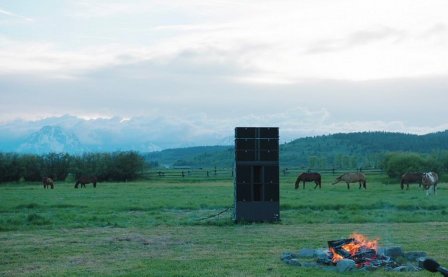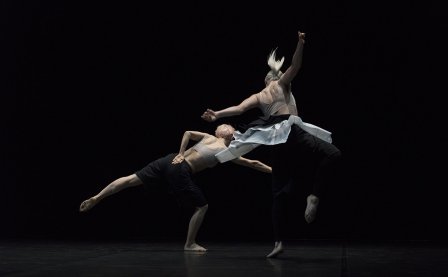The first time I heard Double Negative’s single “Dancing and Blood,” I thought “Wow, this sounds a lot like my Eustachian tube dysfunction…” It was a curmudgeonly stumble of subdued club dynamics, a pounding heartbeat progressively submerged in shrouds of distortion and static/white noise. It seemed aggressively minimal — all about the pauses, the exits, the valves, and the vents. Was this another veteran band deciding to throw a loud party on the precipice of political/climate oblivion? The old guy in the club in the song’s promo a figure for working out a late-career rebellion à la Thom Yorke?
Without its companions on the album, the exercise could have seemed like a middle finger to the old Low, but then the cryptic “Quorum,” the album’s opener, drifted into view. Listening to the songs as they were designed to play, it became clear that the fluctuating volume, the interruptions of static and noise were more a deliberate setting for this experiment than merely a stab at reinvention.
When we listen to Double Negative, we actively participate in this experiment. If we want to find the songs, we have to feel them — down there in the textured noise, holding together in slow, considered arrangements (in a way, Low songs have always had this formal, still relationship within their parts; it’s just being teased out to its extremity here). Our brains have to do a little more work this time — to make sense of scrambled signals, to find the tooth of the wave, the treads between surface and pressure (sound, intention).
Low songs tend to open and close fairly straightforwardly, but Double Negative dances with us. Nothing quite ends or begins, it just shifts weight. One of the most masterful things about the album is the way it flows, highlighting fugitive detail the way clothing highlights body parts, abandoning the traditional ups and downs of verse/chorus structure. Double Negative owes this poise to its intentional construction — a collaboration and a transferring of creative heft. The band has spoken about opening up its song fragments to Ones and Sixes producer BJ Burton to solder into final form in the studio. Burton even gets a writing credit in the liner notes. This new piece of the structure is enough to demand not only major shifts from the band, but also what seems like a seismic reconciliation with themselves, a sense of accumulated energy finding the right mold into which to pour their statement. Alan Sparhawk has spoken about the battle between letting the songs be pretty and unleashing the devil-may-care energy of rock & roll. Double Negative somehow resolves this problem with its unifying yet alien sound.
On “Rome,” Sparhawk repeats the lyric “always in the dark.” It’s the cry of finding oneself always far below a circling purpose, whether it’s global powers or fate itself. Double Negative finds a way to rage against this powerlessness by keeping energy in reserve yet staying switched on, letting the Parker/Sparhawk vocal harmonies wash over slabs of bleak reverb, alternating fighting lyrics with ones of resignation: “It’s not the end, it’s just the end of hope.”
Feeling is a word that often has a muddied reputation in the world. But it depends whether we’re talking about feeling or feeling. One is a reaction, temporary bursts of refined emotional flavor (outrage, emojis). The other is a sense, something that helps us find our way in the dark. What Double Negative seems to be doing is provoking the listener to actually feel the songs, not by way of the old associative emotions — the you’s and I’s, the easy reactions — but through the deconstruction of what’s habitual, returning music to what it actually is: this other form of communication.
“Instruments and music in general, have the ability to create something that did not exist before,” said Alan Sparhawk in an interview. “How does making a few metal strings vibrate translate to meaning and emotion, through time and space? It exists but does not.”
Whatever the intentions behind the making of this record, Low seem to be exploring music as presence — presence being one of the only ways we have to cut through the noise and confusion, the surfaces and appearances of our chatty, deceptive environment. Music can be a reminder that other forms of communication still exist (sometimes kinder, sometimes truer, sometimes more direct, other times more indirect).
An essay I once read on the Poetry Foundation website talked about how artists bond remotely with their audience. The idea was that even curmudgeonly poets have no idea how much they are loved. If the comments on YouTube are anything to go by — “this song/band saved my life” — musicians, in their turn, are the social workers of the art world. Musicians and artists in general are often engaged in remote communication, a being-there by not being there. In some ways, this indirect communication lines up more closely than ever with what we’re all doing these days — gauntlets thrown, #shotsfired, creative works broadcast to a fragmented, oversubscribed world.
One theme that runs throughout Double Negative is dancing, such as the titles “Dancing and Fire” and “Dancing and Blood,” and the club scene of the promo. In drawing on the dance/club side of music, a connection can be made with the cozy compartmentalization of today’s music, in which dance, the music of the body, gives people a way of being seen and finding others within the perplexing hive of genres and bands. These scenes seem to exist now more as a way of being physical and being together than revering one artist over another.
Music has always been a way of being both alone together and together alone. The bedroom ceiling peels away to reveal the lights of a club. This loneliness and presence is like life — it’s not so much that we don’t get out of it alive, we don’t get out of it at all. Everyone is here, so we’re just going to have to learn to live with each other. Because the fact it can be so big and dark doesn’t diminish the fact that it is, and that we can always feel each other’s presence in it all the time. That presence, that physical presence is approximated by music, a true mechanical not electrical disturbance of the air, like arms holding us in the dark….
Double Negative may be a rebellion against the hangups of the past — not as a change of outfit or even attitude, but as a way to feel out the world again, via method, not madness — without bright lights or guarantees, with the frugal companionship of the practices that keep us whole, be they music or work or taking care of other people. Because the physics of sound informs the dynamic of this searching, Double Negative, while glowering and sinister AF at times, reads as a deconstruction rather than a destruction: a dark, gritty band of interference that’s fallen across the path. In a more subtle way, it appears to be Low’s first political album since Drums and Guns. “You put away the book, what are you waiting for?” “Quorum’s” lyrics intone. What happens when we put away the book, relieve the unnerving and isolating Word from its duties, and start thinking (and feeling) for ourselves? It’s not clear, but these days, it’s not merely wistful — it’s urgent. As the lyric that I think I hear on “Rome” suggests: “Let’s turn this thing up before they take us out.”
More about: Low




